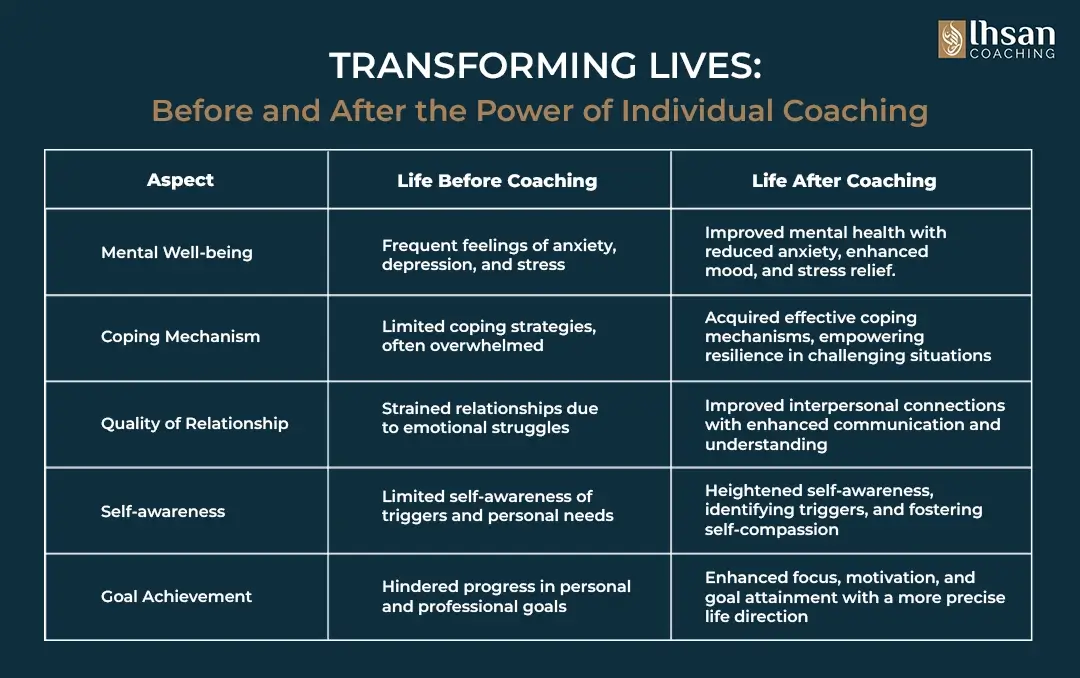There should be no cultural or religious barriers when it comes to mental health related issues. Let us explore mental health within the Muslim community, where everyone faces challenges, yet each person has their own unique journey. Despite being from diverse backgrounds, we often share similar everyday struggles. It’s crucial to explore Muslim mental health and understand the unique aspects of Islamic therapy. Let’s uncover these problems together and enhance our comprehension of mental well-being from a Muslim’s perspective.
Mental Health from an Islamic Perspective
In Islam, the need to maintain one’s mental and spiritual health is frequently highlighted. Understanding spiritual and psychological problems, as well as adhering to the fundamental tenets of Islam, are prerequisites for developing a strong relationship with Allah.
A Muslim’s psychological, emotional, and social well-being is often discussed when it comes to mental health and Islamic therapy. Understanding mental health requires a thorough grasp of cultural and religious elements that may effect a person’s mental health. It’s critical to understand that members of the Muslim community might experience a range of mental health concerns, just like members of any other group.
What are Some Common Mental Health Concerns?
✔️ Stress:
It is described as the body’s reaction to a need. Stress-related physical, emotional, and behavioral issues can all negatively impact your health, mental well-being, and interpersonal and professional relationships.
✔️ Generalized Anxiety Disorder:
An overwhelming concern or worry about issues unrelated to an incident creates stress. Sleeping issues, a sense of fear, chilly or hot hands, a dry mouth, shortness of breath, and an inability to maintain composure are just a few general symptoms.
✔️ Panic Attacks:
Four symptoms involve a sudden onset of acute dread and discomfort that peaks in minutes: rapid heart rate, shaking, sweating, nausea, choking sensation, chest discomfort, disorientation, and anxiety of losing control.
✔️ Major Depressive Disorder:
Depression is a persistent sense of helplessness and sorrow. It consists of various symptoms that impact how well the person can work, sleep, eat, and enjoy life regularly. It may only happen once, but it usually happens numerous times throughout a person’s lifetime.

Anxiety in Islam: Understanding the Causes
Anxiety, stress, and depression are complex emotional states that can impact individuals on various levels, including spiritually, mentally, and physically. In Islam, these states are acknowledged, and the faith offers guidance on understanding and alleviating them.
1. Lack of Tawakkul (Reliance on Allah)
One significant cause of anxiety in Islam is the lack of trust and reliance (Tawakkul) in Allah. When individuals excessively worry about the future or feel overwhelmed by challenges, it may stem from a weakened sense of trust in Allah’s plan. Spiritual Coaching encourages believers to trust Allah while actively striving for their goals, understanding that the outcome is in His hands.
2. Straying from Faith Practices
Deviation from consistent religious practices, such as prayers, recitation of the Quran, and engaging in acts of worship, can contribute to anxiety. In Islam, these practices are seen as spiritual anchors that provide solace and a sense of connection to a higher purpose. Neglecting these practices may lead to a spiritual void, intensifying feelings of anxiety.
3. Attachment to Dunya (Worldly Concerns)
Excessive attachment to worldly matters, wealth, and material success can be a source of anxiety. Islam emphasizes the temporary nature of worldly life and encourages believers to focus on the eternal aspects of their existence. When individuals become overly consumed with worldly concerns, they may experience heightened stress and anxiety.
4. Unhealthy Comparisons and Envy
Comparing one’s life to others and harboring feelings of envy can contribute to anxiety. Islam teaches contentment (Qana’ah) and gratitude for what one has. Constantly comparing oneself to others or feeling envious of one’s possessions and achievements can lead to dissatisfaction and anxiety.
5. Societal Pressures
Societal expectations and norms can exert significant pressure on individuals. The desire to conform to societal standards in terms of appearance, success, and relationships can lead to stress and anxiety. Recognizing that societal norms are diverse and that everyone’s journey is unique is essential. Embracing individuality and focusing on personal growth rather than societal validation can help alleviate these pressures.
6. Exam Pressures
Exams are a common source of stress, particularly for students. The fear of academic failure, grand expectations, and the competitive nature of education systems can contribute to anxiety. Effective time management, adopting healthy study habits, seeking support when needed, and maintaining a realistic perspective on success can help mitigate the pressures associated with exams.
7. Job Hurdles
The professional landscape often comes with its own set of challenges and pressures. Meeting deadlines, achieving targets, and navigating workplace dynamics can lead to stress. Establishing a healthy work-life balance, setting realistic career goals, and fostering open communication with colleagues and superiors are crucial strategies for managing job-related pressures.
8. Other Life Challenges
Life presents various challenges beyond societal, exam, and job pressures. Relationship issues, financial concerns, health struggles, past traumas, or personal crises can significantly impact mental well-being. Acknowledging these challenges and seeking support from friends, family, or mental health professionals is essential. Islam encourages prayer and seeking solace in faith during times of difficulty.
9. Failure to Seek Help and Support
Islam encourages seeking help from both spiritual and professional sources. Failing to acknowledge and address mental health challenges may exacerbate anxiety. Islam encourages individuals to seek counsel, whether from religious leaders or mental health professionals, to overcome personal struggles.

Tips to Maintain Mental Health from an Islamic Perspective
The necessity of self-care, emotional equilibrium, and asking for assistance when necessary is emphasized in both the Quran and Hadith. Islam advises people to care for their health to serve their community better and carry out their religious obligations. Therefore, some advice is provided in the Qur’an and Hadith to preserve our mental health. Let’s look at it!
✔️ Have Faith in Allah:
The basis of Muslim mental health and Islamic therapy is faith. It offers consolation, hope, and a feeling of meaning. Many Muslims seek comfort and direction from their faith during difficult times. Possessing faith in a higher power is a potent source of fortitude. No matter what feeling is plaguing you: stress, worry, despair, or anger, remembering Allah and pleading for His assistance and pardon will consistently deliver you from unsettling ideas.
✔️ Focus on Positive Thoughts:
This notion is fundamental in the social media age we live in. On social media, people portray beautiful, flawless lives that are free of imperfections. The truth, however, is far different. Muslim mental health and Islamic therapy focus on counting your blessings and the good things in your life rather than concentrating on what they are showing. Thank Allah for your blessings and the lack of others. It will help you relax and relieve your tension.
✔️ Availability To Others and Self-Help:
Being generous and kind to those you know and love entails being accessible to them. You will feel happier whenever you lend a hand to others. Allah has also given you the ability to assist others as a gift. It is a Sunnah to help others and improve the world, whether that assistance takes the form of charitable giving or making people happy.
✔️ Take Professional Help:
It is critical to have access to expert mental health care. People needing specialized care must get assistance from qualified experts who can handle their particular demands. Muslim mental health and individual Coaching take action to care for people’s health through self-care and coping mechanisms in addition to receiving professional assistance.
Here’s a table comparing life before and after individual coaching for anxiety management, symptoms of depression, and stress:

Individual coaching for anxiety management, symptoms of depression, and stress provides personalized support, empowering individuals to overcome challenges and lead a more fulfilling and balanced life.
Muslim Mental Health Well-being with Faith, Expertise, and Community Support
At Ihsan Coaching, we provide a holistic approach to healing. Our religious consultations uniquely blends faith-based principles with professional expertise. Join us on this transformative journey towards well-being – where faith, professional guidance, and community support converge for a brighter, healthier future.

